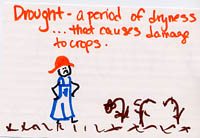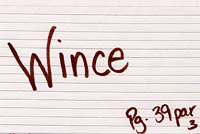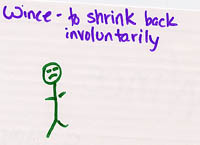Out
of the Dust
Section 2 (pages 30-51)
Instructions: Your job is to write five questions for
section one of your book. Your questions should include MCEOG, Cause/Effect,
Critical Thinking, Prediction and Fact/Opinion. Be sure to include the page and
paragraph number with your answer.
MCEOG:
- All of the following describe Ma except:
- Mean
- Proud (p. 30 par. 2)
- Strong (p.33 par. 2)
- Caring (p. 49-50)
Answer: a. Mean
Cause/Effect:
Effect: It will be a miracle if Daddy gets five bushels to his acre.
Cause: The dust has killed most of the wheat. Even the rains
are too strong and also add to the destruction of the wheat.
Under what circumstances does Ma allow Billie Jo to go play piano with Arley and the Black Mesa Boys?
Answer: page 49-50.She can’t be dragging out of bed, or
falling behind in her farm chores.
Arley’s wife must also keep an eye on her.
Billie Jo likes being on the road with Arley, playing piano.
Fact. Page 50-51.“It’s being part of all that, being part of
Arley’s crowd I like so much, being on the road, being somewhere new and interesting.
We have a fine time. And they let me play piano, too.”
Do you think that Billie Jo will continue to play the piano, even though things are getting worse with the dust?
Answer: I think that she will still play the piano
throughout the entire book because she enjoys it so much. Playing the piano is
part of who Billie Jo is.
Instructions: Your job is to find 4 passages from section two that interest you.
These sections should be:
*Funny/Amusing
*Descriptive
*Figurative Language
*Informative
For each passage:
- Write down the page and paragraph number
- Write
the first two and last two words of your passage
- Why
did you choose this passage?
- Ask a
question about your passage.
- Say
why you think the author wrote this passage (to describe, to entertain, to
inform or to persuade).
Figurative
Language
- Page 31, Par. 1
- “I heard. . .spindly legs”
- I chose this passage because it uses imagery to allow the reader to see the storm as it is developing across the land, with lightning dancing around.
- While reading this passage, what kind of storm did you think it was? Did your opinion change when you got to the next section?
Answer: I originally thought it was a thunderstorm that would bring rain, but it turned out to be another dust storm.
- The
author’s purpose is to describe.
Descriptive
- Page 43 Par. 1-2
- “Ma has. . .home, together.”
- I chose this passage because it gives a great description of the apple trees. In this time of dust and dirt, these are green, growing things.
- Why have these two trees managed to stay alive during the entire drought?
Answer: Ma has taken special care of the trees to make sure they lived long so that they would bare fruit that they could eat.
- The
author’s purpose is to describe.
Funny/Amusing
- Page 50 Par. 2
- “When I’m. . .piano, too.”
- I picked this passage because it gives you the sense of how Billie Jo feels when she is on the road. I can just picture them flying down the road, possibly in a convertible, with their arms stretched to the sky. They are also singing at the tops of their lungs and beating on the seats as if they were a drum set. This is a fun passage.
- What is the term for the way Vera is singing? (“chirps crazy notes with no words”).
Answer: Skat
- The author’s purpose is to both describe and amuse.
Informative
- Page 40-41
- “Ma says. . .doing chores”
- I chose this passage because it gives the reader a look into Ma and Daddy’s relationship and how they speak to each other.
- How does Ma calm herself down after she gets angry with Daddy?
Answer: She goes out to the chicken barn and does her chores
- The
author’s purpose is to inform.
Word
Wizard
Instructions: Find the following words in the section that we read for today:
Drought p. 31 par. 3
Ratcheted p. 32 par. 1
Wince p. 39 par. 3
Cast-off p.31, par. 3
For each word:
1. Write the word and the page on which you found it.
2. Write the sentence from the book that used the word.
3. Look up the word in a dictionary and write to formal definition.
4. Write the correct part of speech (noun, verb, adjective, adverb)
5. Write an original sentence using the word.
6. Make a Word Wizard Card for the word. Each card should have:
a. The word in BIG print
b. The page and paragraph number where you found the word
c.
On the other side of the card: a picture, the word and the
definition of the word.
1. Drought p. 31 par. 3
2. “I watched the plants, surviving after so much drought and so much wind, I watched them fry, or flatten, or blow away, like bits of cast-off rags.”
3. A period of dryness especially when prolonged that causes extensive damage to crops or prevents their successful growth.
4. Noun
5. The lack of rain caused a drought that killed most of the flowers in our garden.
6.
Word card:
|
|
|
1. Wince p. 39, par. 3
2. “I wince at the sight of his rib-thin cattle.”
3. To shrink back involuntarily (as from pain).
4. Verb
5. I winced when I stubbed my toe on the leg of the coffee table.
6.
Word card:
|
|
|
Instructions: You will make a character map of Daddy by writing the following about him:
- Three character traits, an example of each of these traits and the page & paragraph number where you found proof for these traits.
- One of Daddy’s goals in this section.
- One of Daddy’s problems in this section.
- The solution to Daddy’s problem. If no solution has been found yet, predict what might happen.
- Draw
a picture of Daddy.



